
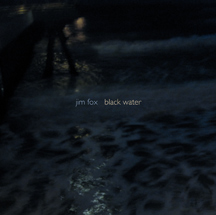
"Those familiar with the music of Jim Fox will find Black Water to be outside of the quiet, introspective style normally associated with the composer…. Black Water begins with an extended trill setting an energetic pace that builds with each successive wave of notes. There is a sense of strong, fluid motion that is slightly out of control—like a running sea in the dark. The notes roil around each of the piano parts, building in intensity and then setting off again without quite discharging the tension. At 3:30 it suddenly becomes spare and quiet; only a few piano notes dripping from the higher registers but with a swirling undercurrent below, like a river gathering its strength in a quiet stretch. The flow soon picks up again and breaks into another swift-flowing torrent of sound. Black Water proceeds in this fashion—strong surges interspersed with quieter sections—but always with a sense of movement in the lower registers. This is exciting music, carrying the listener along in unexpected directions. Black Water could be describing one of our Southern California rain storms—sometimes a blinding downpour and yet with patches of clear sky where just a few raindrops are falling. The contrast between the turbulent and quieter sections of this piece evoke a force of nature, especially in the last two minutes, which boil like the race of water in a flooded canyon. The final crashing chord hangs in the air, slowly dissipating, to provide a fitting end to this high-powered work.... [Pianist] Bryan Pezzone has done a fine job here." —Paul H. Muller, Sequenza21
"[T]he work tracks a nearly relentless shimmering movement that explores the full range of the keyboard. When the lines do linger a bit in a particular area of tranquility, the mood easily turns reflective, but the bulk of [pianist] Pezzone’s work across the three piano parts keeps ears pulled forward, the notes a school of silvery fish rapidly outpacing any ominous predators floating in the shadows…. Bonus points: Where thoughtfully curated collections are fascinating, hodgepodge albums with no clear through-line often frustrate my listening enjoyment. I found that this singular presentation significantly strengthened my engagement with the work and easily encouraged repeat listens."—Molly Sheridan, NewMusicBox
"Driven alternately by furious staccato passages, strident chords and assertive arpeggios with the occasional oasis of restraint ('tranquility' doesn't cut it), this [Black Water] is an energetic whirlwind of a piece that captures and holds the attention." —Roger Thomas, Int’l Record Review
"Black Water is a dramatic, intense piece in which quasi-tremolando textures form an important element. Harmonies and pedal tones are sustained in this way, as is the feeling of substance and a kind of heroic minimalist romanticism which is both forceful and impressively compelling at the same time…. Everyone will have their own associative words for summing up a work like this. I suppose mine would be ‘symphonic’ and ‘cinematic’, the music having an extrovertly theatrical feel which should appeal to multi-piano performers such as Jeroen van Veen. Black Water is a striking and effective piece which stimulates and deserves repeated hearing."—Dominy Clements, MusicWeb Int’l
"Jim Fox’s Black Water starts out…up-tempo and filled with joy—despite the title…, [It] is a pretty strong piece, louder than some of his more recent music—this was composed in 1984. Its four parts are equally strong and minimal, but separated by three interludes which are dark water at night, flowing from one majestic lake into the next. It’s minimal, but parts return and are overlaid with each other, and form ripples in the water, caused by the falling of black rain perhaps. Yet it all doesn’t sound as dark as this might suggest. It’s not joyful for sure, but powerful, present music. Excellent work, and could have easily lasted thirty minutes instead, and very sadly doesn’t."—Frans de Waard, Vital Weekly
"Black Water is a turmoil, a crowning wave of harmonic variations that doesn’t let go."— François Couture, Monsieur Délire’s Listening Diary
l
"Black Water was likely not designed to make you play air piano, but the eighteen-minute piece has that effect…. With a tonal range that spans octaves, you might think the piece was designed to be played by an octopus, until you find out it was written for three piano parts—all played on this 2006 recording (newly released on CD) by Bryan Pezzone. Composed in 1984, Black Water is a more energetic work than those in the rest of Fox’s repertoire, commencing as it does with a gorgeous, bird-like, two-note trill in the upper register, which soon gets washed away by torrents of dark chord clusters from the lower depths. Liquid metaphors soon become hard to resist, so just go with the flow and let yourself get swept away by this piece’s relentless current. Spoiler alert: Black Water memorably ends with a solid minute of a single dissonant chord followed by a full forty-five seconds of unresolved sustain that will make you want to crank up the speakers to soak in every last moment of its bittersweet brilliance. Pump that air-piano fist in the air and claim victory over the vast, uncaring sea. —Jonathan Bunce, Musicworks l
"The work is from 1984, fairly early in Maestro Fox's body of work, but inimitable nonetheless. The score calls for three pianos, ably played via overdubbing by Bryan Pezzone. It's a shimmering, undulating work with multiple tremeloes and emphatic chordal periodicities building together and evolving to create harmonic-motor movement. There is a flowing yet dense layering throughout that suggests water in motion. The music exhilarates and engulfs the senses in a very satisfying way. And it does so with originality and ambient drive. It is a work better heard than described for its all-over dramatic poeticism…. And it has a singularity that's well worth experiencing."—Grego Edwards, Gapplegate Classical-Modern Music Review
"The three pianos here sparkle, shimmer, and shift, moving in waves that are connected in different ways…. Altogether it makes for a swirling, stimulating, mass of shifting currents."—Downtown Music Gallery Newsletter
"Listeners conversant with Fox's discography might come to his latest release expecting it to be restrained and slow, but Black Water, composed in 1984, shows a different side of the composer. Boisterous and aggressive, the eighteen-minute work (for three pianos) is realized by the Los Angeles-based pianist Bryan Pezzone, whose three overlaid parts account for the work's density. The title in this case comes from the Alberto Manguel-edited anthology of short stories that was published at about the same time and serves as an apt metaphor for the churning flow relentlessly pressing forward throughout the piece. In the louder passages, shimmering tremolos act as a rock-hard foundation strong enough to withstand the chords aggressively striking against it, while the quieter sections that offer a welcome respite from the clangorous intensity are dotted with twinkling trills. The density of the material is felt throughout, though never more so than during the closing minutes when the piano rolls in the background begin to resemble a rather volcanic mass. A natural, single-movement piece for the concert hall, Black Water is also a brilliant, roller-coaster ride that's rendered remarkably by Pezzone in a bravura performance."—Textura
"Black Water is a work for three pianos dating from 1984. The pianist, Bryan Pezzone, performs it in the studio via multi-tracking. It begins with a trumpeting tremolo, and the mood, throughout most of the work, is assertive and even abstractly heroic, although there are more reflective sections as well. Fox calls it ‘a churning eddy of ever-changing/ever-returning sound.’ The work’s title suggests something liquid, but the title comes from an eponymous collection of stories that Fox was reading at the time and otherwise doesn’t seem to have much to do with the music. To me, Black Water suggests not just trumpets but bells, which, as Edgar Allan Poe wrote, are associated with a variety of emotional states and circumstances. Fox’s Black Water is abstract and open-ended enough to allow the listener to interpret its tintinnabulations in just about any way that he or she likes. Pezzone swaggers his way through its wrist-breaking difficulties like a boss, as kids these days might say."—Raymond Tuttle, Fanfare magazine
"An 18-minute piece from 1984 that Fox decided to revisit and record a few years ago, now released as a CD single. Bryan Pezzone plays all the parts: three superjacent tracks, right away eliciting chains of thoughts in regard to the Tchaikovsky-tinged magnitude of the louder sections, a slightly different expression for this composer in contrast with the reposeful work for which he’s renowned. The music, manifestly fascinating and for the most part quite intense, is comparable to heavy traffic on a three-lane highway; all types and sizes of vehicles and engines, diverse speeds, occasional risky behaviors in a resonant chordal mass whose dynamic wallop on the listener changes several times…. One must appreciate the dissonant qualities, the unsettling parallelisms, the near-bashing of the keyboard in various instances, the overall sense of continuity in spite of apparent intermissions (in truth, rather spasmodic activities occur under the surface of the quieter moments, also). The lingering sensation, for this writer, is that of a statement of freedom by a never-say-die virtuoso who’s sick and tired of reiterating the trite formulas associated with earlier composers worshiped by rigid-minded conductors and historians. Pezzone stands proud, hitting chords and churning out hypnotically scorching arpeggios with cultivated vehemence…. Incidentally: minutes after having enjoyed this, I went straight to Thelonious Monk’s Solo Monk (1964). The connection of these two antipodal piano gems spun consecutively yields fabulous results for your late night’s mood. Trust me."--Massimo Ricci, Touching Extremese
"The initial octave tremolo puts one in mind of the first movement of Mahler’s Second, a relevant comparison: Fox’s 18:05 single movement alternates stormy and serene. Fox’s language isn’t late 20th-century Austro-Germanic, even if he looks towards Romantic epics. The title is borrowed from Alberto Manguel’s anthology of "fantastic literature." We hear stretched minimalist gestures along with grand pianistic cascades. Dissonance is softened by widely spaced intervals. Subtle reversals occur along the way: Treble tremolos migrate into the bass and deep octaves become high bell tones." — Grant Chu Covell, La Folia
"In comparison with the prevailing sound of Fox's other pieces and other titles on the label, Black Water is pretty wild music. The piece was created in 1984 and is written for three pianos. In this recording, Bryan Pezzone plays all the parts via studio overdubbing. Due to the CD’s length of only eighteen minutes, it is like a single, but during that short time you will hear an above-average amount. Black Water is built on frenetic tremolo chords…. The chords are tuneful and the structure of the music changes gradually…. Although a basic rhythmic pulse is always present, Fox’s music smoothly softens and thickens again in protracted waves. This is a virtuoso piece. However, the speed of the fingers is not a goal but a means of hypnotizing the listener." — His Voice (Czech Republic)
"Like water, the piece is always in motion, a collection of currents that is ever-changing and restless, pulsating and effortlessly kinetic, occasionally slowing to a gentler pace, but nonetheless evoking those same feelings within the listener, shifting moods and perspective as it proceeds. It encircles the listener with warmth and coolness at various junctures along its path, sometimes concurrently, continuing forward with relentless effervescence. Its only shortcoming, if there must be one, is its relatively short length—this piece could easily go forward for an additional half hour and remain interesting throughout its duration. That said, Black Water remains a brilliant and energized slice of contemporary classical music." —Peter Thelan, Exposé
"The music by Daniel Lentz that opens this anthology…is graceful, understated and tinged with melancholy. The closing piece, Jim Fox’s filmic Colorless sky became fog, shares those qualities. They seem to define a Cold Blue soundworld…. This is a post-experimental label, presenting work that subtly channels lessons learnt from radical sources into music that is unapologetically attractive and accessible. —Julian Cowley, The Wire
"For more than three decades, Cold Blue Music has been highlighting the work of composers working on the outer edges of contemporary music, many of whom are based on the West Coast…. [Cold Blue Two] offers a panoramic view of Cold Blue’s offerings, which are quite varied and yet make a powerful unified statement. These works could be described as beautiful oddities—some even devastatingly gorgeous, but always with a twist. Even if unapologetic beauty is not your cup of tea, worry not—upon close listen each one of these works sports frayed edges, chipped corners, or other subtle disturbances that turn it into a highly personal proclamation…. Each work contains treasures to be discovered within, and the heart-on-sleeve honesty of the works is not something one hears often." —Alexandra Gardner, NewMusicBox
"From the introspection of John Luther Adams to the panache of Charlemagne Palestine—the Cold Blue Label has rarely, if ever, failed to put out music whose provocation seems the greater for its thoughtfulness. This is evident on this second miscellany of unreleased miniatures from a rafter of Cold Blue regulars…. Jim Fox rounds off proceedings with the gently enveloping interplay of hammered dulcimer, violin, two cellos, double bass and piano in Colorless sky became fog. All of the performances are as sensitively attuned to this music as might be expected from artists who have graced the Cold Blue catalogue…. It all adds up to a finely balanced and judiciously contrasted collection…a sampler that confirms the tradition of American experimental music to be alive, well and in safe hands. —Richard Whitehouse, Int’l Record Review
"This marvelous CD assembles 14 works by contemporary composers…. While many of the composers here have roots in the experimental tradition, the pieces on this disc are fiercely consonant and infused with unique orchestrations and electronic processing. Fine moments include the stacked steel guitars of Chas Smith, and the pieces by label veterans Rick Cox, Read Miller, Michael Jon Fink, and Jim Fox. Essential!" —Gino Robair, Electronic Musician
"Closing the disc is Jim Fox’s appropriately titled Colorless sky became fog, a surreal piece featuring hammered dulcimer, piano and strings…. Cold Blue is one of those labels that truly has its own recognizable sound, and this compilation is a compendious introduction that I can wholeheartedly recommend." —Peter Thelen, Exposé
"There’s a wistful, yearning beauty to the music." —KFJC Reviews
"This is singular music. Highly recommended." —Gapplegate Classical-Modern Music Review
"With such artists as Daniel Lentz, Ingram Marshal, John Luther Adams, James Tenney, Jim Fox and others, Cold Blue Two stands as a valuable benchmark of the state of early 21st-century music…. evocative, warm, introspective and often profound ... Cold Blue Two is a compelling collection." —Paul Muller, Sequenza21
"CB2 is a great compilation. Jim Fox has quietly been pressing some remarkable CDs on his Cold Blue label out of Venice, CA for a number of years now. It's a wonderful catalog of treasures." —Richard Friedman, Music from Other Minds (KALW)
"Stellar." —Alex Ambrose, Q2 Music producer, WQXR
"This music is as shiver-inducing as it is lovely." —Daniel Stephen Johnson, Q2 Music, WQXR
"Cold Blue Two.… an amazingly beautiful collection… —In the Quiet, PBS-FM
"Cold Blue Two is wonderful." —Joel Krutt, Pushing the Envelope, WHUS
"A superb sequel to the first anthology (issued in the mid-‘80s), Cold Blue Two offers a comprehensive overview of the West Coast label's artists and their respective styles; anyone new to the label will come away enlightened and enriched by the experience. At disc's end, Colorless sky became fog by Cold Blue head Jim Fox also sets itself apart in its incorporation of hammered dulcimer, whose shimmer adds to the piece's already haunting character…. Music that exemplifies refinement without at the same time being overly burdened by formality and convention." —Textura
"Jim Fox’s Colorless sky became fog ends the album with a haunting and very spare piece performed on hammered dulcimer, piano, viola, cellos, and double bass—an interesting combination of instruments that get it just right." —MainlyPiano
[Colorless sky became fog was chosen to appear on The Wire magazine's Wiretapper 33 anthology CD.]
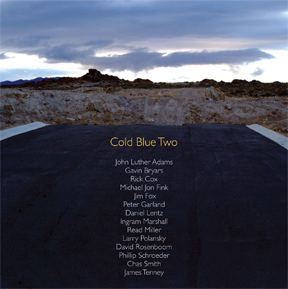
"Pianist Jeri-Mae G. Astolfi has inspired a number of contemporary American composers to write for her and this disc showcases some of those composers and their music. All of the pieces include electronics, but all remain approachable, sometimes indeed cinematographically so…. The final work, by Jim Fox, witnesses the speaking voice of Janyce Collins reading a text derived from the writings of Joseph Dalton Hooker, a friend of Darwin. This is the most filmic of all the pieces, replete with bell tones, plangent chords, and atmospheric allusion." —MusicWeb Int’l
"The pleasure of being lost (2012) ... was written for Jeri-Mae Astolfi and includes the speaking voice of Janyce Collins. The voice is distinct and is accompanied throughout by electronically processed sounds suggesting a steady roar of the wind. The piano is heard as solitary notes and chords between long pauses, lending a lost—but not tense—feeling. The words are spoken in a flat, perfunctory tone and this provides a sense of reassurance. The text is from the 1854 journal of Joseph Dalton Hooker, friend of Charles Darwin and an early explorer of the Himalayas. The words are partly an objective account of the remote surroundings in which he must have found himself and partly the stray thoughts of a wanderer. While this is certainly a solitary account, there is no sense of loneliness or fear. The piano provides a commentary on this discourse, sometimes building a bit of tension, sometimes turning introspective and nostalgic. The combination of voice, electronics and the spare piano passages are in just the right combination for building a convincing portrait of the seemingly contradictory states of pleasure and being lost."—Sequenza21
"Arresting in its own way is Jim Fox's The pleasure of being lost, which overlays Astolfi's elegant playing with a spoken word text (one Fox freely adapted from the journals of nineteenth-century naturalist and world traveler Joseph Dalton Hooker) delivered in hushed manner by Janyce Collins. With the pianist's lyrical phrases augmented by the bell-like shimmer of electronically processed sounds, a sense of serenity and calm attends the piece…. Fox's setting, like the album in general, provides an excellent example of what can happen when a pianist of Astolfi's calibre explores the sonic possibilities that electronic enhancements can bring to a compositional work." —Textura
Composed by Jim Fox, a composer who directs the unique Cold Blue Music label ... The pleasure of being lost combines the reading of a text freely adapted from the naturalist and traveler Joseph Dalton Hooker’s Himalayan Journals (1854) with elaborate electronic textures built from the sounds and rhythms of the voice of the reader, Janyce Collins, the piano, of course, and the sound of bells. A mysterious alchemy, sumptuously slow sounds drifting over the text: a descent into unspeakable, fragile depths. The piano weaves a quiet, simple counterpoint to these whispered words that we do not always understand, yet bear an incredible emotion, an unforgettable charm. Choirs of distant, ghostly voices contribute to and reinforce the music’s evanescence. Magnifique!—Inactuelles: Musique Singulieres (France)
"Fox’s piece adds the human voice, reciting a text by Joseph Dalton Hooker in a throughout quiet piece, not unlike Fox’ music on Cold Blue." —Vital Weekly
"The music is seminal; Jeri-Mae G. Astolfi has an extraordinary presence, a brilliance, that goes a long way to making this an outstanding program." —Gapplegate Classical-Modern Music Review
"Jim Fox’s The pleasure of being lost features the speaking voice of Janyce Collins reading a text freely adapted from the writings of Joseph Dalton Hooker. While the words are often obscured, sounds that accompany the reading are processed from the timbres and rhythms of her voice. The piano and bell tones also accompany the voice—very haunting and mysterious!... If you are seeking a unique listening experience, check out Here (and there)!" —MainlyPiano
"The pleasure of being lost…. Manipulated spoken word lends a deeply human liquidity and phraseology to the frission of the haunting electronic layer, piano sparseness acting as a stairway linking the two. The introspective poetry, and it is poetry, beckons us into the interior space of the heart, recalling a journey, with the mind attempting to provide signposts of ‘what happened.’
"Throughout the gently undulating waves (‘introductions’) of thematic imagery, the piano statements remain positive, optimistic, despite the foreboding overarching shadow of the timbral hue gathering around the innocent sincerity of the passages of text, which push forward against the wall of normalization lent by the electronics.
"As the textual images expand in abstraction, so too does the sense of connectivity between ‘wall and space’ and piano interludes. The intimacy of the voice, the occasionally sensual images, interwoven with moments of physical details of the body’s journey in the physical plane, amidst the heart’s sacred path toward eternity, become mesmerizing, contemplative and reach a climax of understanding as to the profound meaning and meaninglessness of what we experience within and without." —Robert Spalding Newcomb, Array (journal of the International Computer Music Assn)
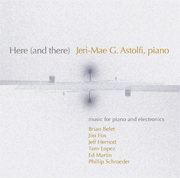
Descansos, past (Cold Blue CB0021)
"Easily the most beautiful thing I heard all week, Fox's haunting memorial for his friend, composer/performer John Kuhlman (1954-1996), scored for four cellos and double bass is deep on so many levels. It's featured on a CD-single offering only 15 minutes of music, but you won't want to listen to anything for a while after you've heard this." —Frank J. Oteri, NewMusicBox (American Music Center)
“Jim Fox’s latest piece [Descansos, past] inhabits the same haunted soundscape as his 2004 release The City The Wind Swept Away—the unconventional scoring (pizzicato bass and nine bowed cellos) produces a sort of lush bleakness that evokes the windswept open spaces of the American West. Perhaps Descansos evokes the strange roadside memorials that gave Fox his title, but to these Eastern ears, it is reminiscent of the brooding lyricism of England’s Gavin Bryars. This is a music that seems to linger even after the recording itself has ended." —John Schaefer, WNYC, New Sounds
"Descansos, past practices yet another kind of soft-grained, southern Californian austerity. Slow-moving and very simple, this harks back to the folky ennui of John Lurie's soundtracks for string quartet, like his score for Stranger Than Paradise. The miking gives the solo strings almost orchestral presence, and the returning bass pizzicatos possibly hint at jazz. Descansos, past is harmonically driven, and so Fox's style counts as the most obviously traditional of the three. But his piece ends in mid-sentence, emphasizing the fragmentary, quasi-improv character and showing that he—unlike so many composers nowadays—knows exactly when to stop." —Arved Ashby, Gramophone
"Descansos, past also deals with memory, but its sense of loss is sharper, more immediate. … this is a work of noble mourning; its mood is sombre and its heavy, halting ‘tread’ connotes funereal footfalls (in fact it was written in 2004 in memory of the musician John Kuhlman). Against a backdrop of bass pizzicatos, the cello choir intermittently intones slow homophonic phrases—fragments that one might hear as the remnants of some long-forgotten chorale. Thanks to playing that is warm toned, full-bodied and unerringly precise, the string textures glow darkly and their colors deepen the pervasive mood of dignified reflection and restraint." —Christopher Ballantine, International Record Review
"Jim Fox's haunting Descansos, past is a single, 15-minute work scored for pizzicato double bass and nine bowed cellos. … The piece is reminiscent of a smaller-scale Górecki's Third Symphony—the cellos continually shifting harmonic movement evokes clouds passing by or sand blowing in the desert. The result is sound that is somber without being morose—a haunting threnody, even if it is not billed as such.
"The performances are excellent all round. The cello ensemble's playing and intonation are splendid throughout this piece, which has them using the entire range of their instrument, including some difficult fingerings and artificial harmonics. Bassist Barry Newton provides rock-solid underpinning for the cellists to play over. He tackles the bass solo passages with considerable artistry, and his execution of the double-stops and arpeggiated chords—some of which are technically taxing—is first-rate. … Descansos, past is well worth a listen." —Chris Kosky, Double Bassist magazine
"Another beautiful release from the Cold Blue label ... The rich textures and dark moodiness of this piece envelope you in a full-body experience, the deep tones being felt on the skin at the same time as they are heard. Fox has achieved a wonderfully rich balance of instruments while at the same time maintaining good compositional cohesion throughout, succeeding in a combination of instruments that is far more challenging than would be expected. A wonderful and invigorating experience." —Randy Raine-Reisch, Musicworks (Canada)
"Jim Fox’s piece Descansos, Past (Cold Blue) is an utterly beautiful, aching work; a meditation on journey and loss, scored for cellos and solo double bass. Fox has a remarkable ability to balance darkness and light in his music; what seems at first a state of calm questioning might, as this work unfolds, open up the listener to a deeper sense of the awe and mystery at the heart of sound and thought. " —Kevin Macneil Brown, "Back for More" (Kevin Macneil Brown's six most memorable recordings of 2005), Dusted magazine
"… immediately appealing … a requiem-like piece for double bass (always plucked) and an ensemble of four cellos (always bowed), multiplied by overdubbing into a choir of nine. The plucked bass notes would suggest jazz were it not for their hypnotic obsessiveness, like the tolling of bells. The bowed cello chords reach from the instruments’ rich lower registers to their keening uppermost reaches. If Samuel Barber had been born a half century later as a forward-looking resident of the West Coast, his Adagio for Strings might have sounded a lot like Jim Fox’s Descansos, past." —Raymond Tuttle, Classical.Net
"Descansos, past sounds like the sweetest dirge ever, where the pain for loss seems to be diluted in serene recollections. … the 15-minute composition develops around the dialogue of solemn, repetitive bass picking, and the driving power of the strings, literally lifting the piece to the sky. As with his previous ep, The City the Wind Swept Away, Fox has written some painfully emotional music, and I envy the sage outlook on living it suggests.." —Eugenio Maggi, Chain D.L.K. (Italy)
"Composed in memory of composer John Kuhlman, Fox's haunting Descansos, past is performed by Barry Newton on double-bass and four cellists (performing nine parts), though the work's tonal range finds the latter often sounding like a conventional string ensemble. Permeated by a tender sadness ... meditative and pensive, even funereal in tone." —Ron Schepper, Signal to Noise (summer ’05) and Textura (May ‘05)
"Dedicated to the late composer/performer John Kuhlman, Descansos, past is a short composition for double bass and superimposed cellos that alternates a sense of poignant regret … with powerful playing by bassist Barry Newton, who at decent listening volume is able, through sheer timbral intensity, to solicit some serious glass shaking in the living room. Steering clear of sugary sentimentalism, Fox's concise statements, performed superbly by cellists Erika Duke-Kirkpatrick, Jessica Catron, Aniela Perry and Rachel Arnold, describe a sober celebration whose orchestral flavor is enriched by rewarding aural poetry, like an inscription on a tombstone to be read with a faint smile instead of tear-stained eyes."—Massimo Ricci, Paris Transatlantic
"Descanso, past majestically gives tribute to the memory of composer/performer John Kuhlman. . . . This is some really beautiful music. The pizzicato bass and the bowed cellos hold an intense dialog, the bass supporting the strings while they play sustained chords and melodies or the strings backing up the bass while he solos." —David Beardsley, Downtown Music Gallery Newsletter
"The music is full of shattering stillness and stark beauty. What is evident is the sparkling warmth it evokes. The layers are presented gradually and eventually, as the 15-minute piece comes to a close, you're left with something that is left in your head. Its stillness is consuming and grand." —Tom Sekowski, Gaz-Eta (Poland)
". . . a nice, intimate piece. . ." —Vital Weekly (The Netherlands)
"Jim Fox is known for works that tend toward the enigmatic and moody while retaining an arresting pellucidity and lyrical grace. Descansos, past, a 15-minute-long composition for pizzicato double bass solo and a "choir" of bowed cellos, fulfills the alluring tonal possibilities inherent in such an ensemble, and also manages to unfold within a gently narrative arc that is unusual in contemporary composition.
"Descansos are a part of Latino culture in the Southwestern U.S. Roadside shrines made up of crosses, flowers, everyday objects, and painted words, they mark with honest and heart-felt expression the actual geographical places of sudden, accidental death. Indeed, the word descansos itself implies an interrupted journey. In the light and shadow of such a concept, it should come as no surprise that this work is elegiac; written in memory of John Kuhlman, a fellow composer and friend of Fox.
"The work begins with a quiet lushness, the bass murmuring gently with a single repeated note while the strings rise slowly to a warm, lyrical, chordal melody. Soon, however, the bass and cellos begin a sort of question and answer; the bass restless and rumbling, questing; the cellos, arrayed to exploit their full range—from mellow low notes to highest harmonic-induced haze—offering a sort of balm. Near the halfway point, the double bass takes over, with a rhythmic, troubled -yet-gentle cadenza that is, in its calm passion, reminiscent of one of Jimmy Garrison’s solos with the John Coltrane Quartet. When the string choir returns, things have turned around: The bass now seems serene, the cellos sing with a new dissonance.
"The end of the piece is starkly beautiful. Once more the bass rumbles alone, but with a resonance almost like slow-motion bells. Then, a hushed and consonant answer from the bowed strings that sounds like an arrival—a penitent and graceful melody in dignified harmonies that hints at the resigned gravity of a late Beethoven Quartet. And then the piece ends abruptly; the journey is interrupted.
"Comparisons might be made to works for similar ensembles by Arvo Part and Gavin Bryars. And the dark tonal colors here are similar to those to be found in, for example, Part’s Cantus In Memory Of Benjamin Britten or Bryars’ By The Vaar. But Descansos, past has a sense of openness all its own, with moments of silence at its interstices, letting in both space and light." —Kevin Macneil Brown, Dusted Magazine
"It is a somber and moody piece, very similar at times to a classical elegy, and at other times, while not cheery or upbeat, the music heads into more minimal and sparse impressionistic territory so that the mood, while desolate, is not mournful or morbid. Regardless of the mood of the music at any one instance on the recording, the beauty of the cellos is self-evident, and Newton's bass work is evocative and nuanced. As with the other Cold Blue Music EPs I've reviewed, engineering and production are sterling and the accompanying digipack artwork displays an eye for uncommon aesthetics. Covers of Cold Blue Music releases are, basically, true artwork and Descanos, past does not break from that tradition.
"Moving from solo double bass passages that are propelled by thumping notes that resonate with anger and grief at the loss of a loved one, the music can then shift into a sensitive quasi-adagio in which the massed cellos weave a delicate sad melody while the solitary bass anchors the emotion with sparse yet powerful plucked notes. Like the lonely and forlorn landscapes on the front and back of the CD case, the music contained within speaks of human emptiness and loss that sits beside the beauty and warmth of fond remembrance. … For gray-sky days and dark nights of the soul, Descanos, past will fill the emptiness in your soul with a sense that you are not alone in your pain. Highly recommended." —Bill Binkelman, Wind and Wire
"Descansos, past, for cello quartet and double bass, speaks a very slow romantic minimalist dialect, often with dark, moody harmonies. Despite its relentlessly subdued mood, low register and slow pace, it is creative enough to hold interest." —American Record Guide
"A peculiar world, with eerie yet wondrous landscapes, as well as zones of atemporal solitude." —Amazing Sounds (Spain)
"Mysterious and delicately introspective…" —Peter Thelan, Exposé magazine
"Thinking about the records I liked best in 2005, I can’t help but remember the handful that had something--a strange beauty, a sense of mystery, an enigmatic energy perhaps—that drew me in to listen again and again. … Jim Fox’s piece Descansos, past (Cold Blue) is an utterly beautiful, aching work; a meditation on journey and loss, scored for cellos and solo double bass. Fox has a remarkable ability to balance darkness and light in his music; what seems at first a state of calm questioning might, as this work unfolds, open up the listener to a deeper sense of the awe and mystery at the heart of sound and thought." —Kevin Macneil Brown, Dusted Magazine (from "Back for More," KMB's "most memorable recordings of 2005")
"'Descanso' is Spanish for 'rest,' 'peace and quiet' and those words give a rough description of the music on this CD single. Newton’s strong, stately bass supports and departs from the able cellos, and the whole adds up to austere beauty. This platter does suggest a place of calm, but the emotions connected with lamentation, penitence and sorrow are also in play here. A fine record is the result." —Richard Grooms, The Improvisor
"The best artists sometimes give you what you didn't know you wanted because you never heard it like this. Jim Fox and his Descansos, past does that. It's a fifteen-minute piece, a lament, an adagio for pizzicato contrabass and nine arco cellos. The contrabass comes through with some moody quasi-neo-post flamenco meditations that the nine cellos counter with excruciatingly beautiful but sad blocks of harmonic cloud. It goes back and forth between these poles, more or less, for the duration…. It is heartrendingly beautiful music, a dirge with a profound feeling of loss. Never has their been a more moving piece of such suchness. It is filled with living sound-memory. Ravishing chamber music! Listen to this one!"—Gapplegate Classical-Modern Music Review
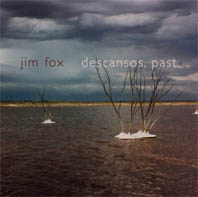
“Beautiful and evocative work . . . very atmospheric music.” —John Schaefer, WNYC, New Sounds
"Though just under 23 minutes, The City and Wind Swept Away, performed by a small ensemble of trombones, piano, violins, viola and cello, seems to linger in the air (and the ear) much longer. Delicate and open throughout, it seems to encourage a state of nostalgia in the listener." —Molly Sheridan, NewMusicBox (American Music Center)
"Devastatingly beautiful." —Christopher Cerrone (Twitter)
"Music that . . . feels as if it could go on endlessly . . . music that comes from the classical tradition, but that feels like it belongs somewhere other than the concert hall, . . . texturally rich, meticulously crafted and delicately beautiful." —Dusted
"The writing for trombones and strings connotes the misshapen fragments of some organ chorale, immensely slowed down, blown on the wind from afar; meanwhile the piano steadily picks out repeated notes, as if the simulation of some slow pealing of bells. Part of the pleasure of the piece is in noting how these sounds mutate, gradually, unpredictably, and in tracking the subtlest shifts in register, color, weight and momentum. So quiet and eventless is the terrain that any change can startle: as happens when the ‘bells’ momentarily fall silent, then resume in a glorious coda-like transfiguration in which everything, and nothing, has changed. As we know from the music of Feldman, this kind of attentiveness to the integrity of slowly passing sound events can be a strangely moving experience. It is so here." —Christopher Ballantine, Int’l Record Review (UK)
"... bleak, austere, even sad, but compellingly beautiful. It could go on forever." —Richard Friedman, Shuffle Boil
"The 23-minute piece is a drifting and immensely beautiful journey at the heart of night. Be it driven by the minimal, yet solemn piano lines, or shivering with the string sounds, the track has both a strong, hypnotizing coherence and a spacious texture, leaving room for your mind to wander and fill it every time with new feelings. I've listened to it often while reading McCarthy's All the Pretty Horses, and it was perfect to evoke those sad and majestic landscapes." —Eugenio Maggi, Chain D.L.K. (Italy)
"Jim Fox . . . reaches great heights. Four trombones and a string quartet, alternating and superimposed, ride on the line entrusted to the piano. The impression is of a certain motionlessness . . . at any particular moment, the result is very interesting, and the music is very pleasing to listen to. I am sure that The City the Wind Swept Away will not disappoint those who liked the excellent Last Things from 2000, whose intimate blue-night tonality is taken up again here." —Sands-Zine (Italy)
"Beautifully recorded music with suitably artistic packaging . . . The City the Wind Swept Away is a beautiful, light instrumental presentation. . . . this is definitely music worth spending time with." —Randy Raine-Reusch, MusicWorks
"Is music, at its most ghostly, ours? Enter the snowy quietness of fate: Jim Fox's gorgeously titled The City the Wind Swept Away prepares for a Fest der Darstellung, a commemoration of places we seem to keep in a corner, where the precious remain, only to be recalled when necessary. … captivating and truly refreshing. … The music infers a fragile ecosystem that embraces a metaphoric complexity; while observing the landscape, we won’t remain the same." —ei magazine
"It is a beautiful suite of a soft, romantic, magic and deliberate style . . .The music presents a melancholy hue." —Amazing Sounds (Spain)
"This is an uninterruptedly slow and quiet work, dominated by shifting and repeated patterns of a few notes from the piano—imagine a music box on its last legs . . . Long held notes in the strings and brass support the piano part, creating an atmosphere that is both ethereal and oppressive." —RaymondTuttle, ClassicalNet
"The sound of the trombone and bass trombone add a haunting, dark effect to the music . . . the main instrument is the piano however, and everything swirls around it—desolate music, or rather the music of desolate places—maybe the sound happening when a city is indeed swept away by the wind." —Frans de Waard, Vital Weekly (Netherlands)
"Keening string harmonies and soft trombone rumbles drift through the piece’s desolate expanses with Bryan Pezzone’s sparse piano playing the delicate thread, his triads forming a pensive pendulum. There’s a static quality to Fox’s piece while, at the same time, an inexorable if glacial impetus nudges it forward. The sparseness of the instrumentation helps create the impression of emptiness, an impression reinforced by the work’s title." —Ron Schepper, Textura and Stylus (UK)
"Jim Fox’s gorgeous meditation for trombones, strings, and piano." —Andrew Ford, Australian Financial Review
"Jim Fox's new ep is a compelling instrumental track . . . As with his last CD, the tone is meditative, quiet, and highly reflective . . . not unlike the groundbreaking work Brian Eno did with Harold Budd . . . it's another favorable notch in Fox's growing catalog of valid sonic experiments." —Exposé
"Characterized by quietude . . . the melodic theme gently lifts off with a piano, to be later backed by deeper and lower reverberating trombone tones. The composition floats on the selective, gentle, and calm moods it evokes. Meditative and restful, it makes a great listening and a potential immersion into innumerable things. More a 'classical' than an ambient piece, it deserves full merit for its virtues, leaving you absorbed yet emotionally alert after each listen." — Erkki Luuk, SONOMU
"Tranquil piano drifts amidst a misty manifestation of smoothly sighing classical strings. As the piece progresses, the piano settles into a dominant position, pensively dripping off notes with a somber laziness while allowing the strings to circle at the composition's periphery like birds keeping tabs on an abandoned harvest crop. Hiding in the mix, the trombones whisper like spectral sentries. Sparsely structured, this elegant music suitably evokes the notion of urban aspects wafted away from a city, stretching like a stately breeze over outlying agricultural regions." —Sonic Curiosity
"Jim Fox…one of the most fertile, intriguing composers in ‘radical tonality’ today, turns in a fine work…The City the Wind Swept Away. It is a slow-moving, somewhat mysterious, supremely atmospheric work for two trombones, two bass trombones, piano, two violins, viola and cello.... And the performance is all you could wish for. At the center are slowly moving piano patterns—broken, arpeggiated chords swinging like a slow pendulum—sometimes breaking free, only to return to another ostinato pattern. The strings and trombones come upon us as variable translucent blocks, like mists rising over a flat, empty expanse, then dissipating, to be replaced gradually by other chordal blocks of heightened tonal colors. It’s music of beauty and wonder, something that goes well with a sunset or sunup in an otherwise silent room. This is strongly engaging associative music that unfolds in a sonic panorama with great calmness and grace. It will give you pause, make you drift someplace good. Excellent."—Grego Edwards, Gapplegate Classical-Modern Music Review
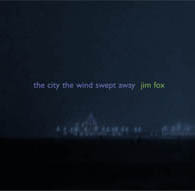
"In turns beautiful, expressive, contemplative and haunting, this is music that slows the listener's world to a crawl; he is thus free to explore all its wonders, both its lights, shimmering and bright, and its shadows, creeping intently over the surfaces of things. Recommended." —Incursion Music Review (Canada)
". . . a kind of warm, glistening atmosphere that stirs memories of the Los Angeles night. ... chamber music that goes softly into the ear without putting it to sleep."—Fanfare
"Fox's Between the Wheels deposits a sparse melody over tremolo string carpeting—of the three quintets it is the piece with the most personal approach." —All-Music Guide
"A mysterious sustained-tremoli work . . . delicate music . . . There's a high whispering violin harmonic reminiscent of Crumb's Night of the Full Moons, and here the timbre is explored fully." —21st-Century Music magazine
"Quiet and unashamedly tonal writing . . . out of time, in a way." —Signal to Noise
"A rarefied atmosphere and great subtlety in the interweaving of the structure." —Il Manifesto (Italy)
"Fox presents a plangent clarinet melody: nearly immobile, it rises from the sound of the player's breath and seems to want to disappear back into it, yet succeeds in stirring into life a series of pulsating string tremolos." —International Record Review
"An enveloping mood of quietness, a pensive and subdued lyricism." —Blow Up (Italy)
"Fox’s gentle 'Between the Wheels' shows that strings can create a hovering, birdlike atmosphere. ... a success." —Richrd Grooms, The Improvisor
"Music that could as easily give meaning to the long lanes of palms lining the streets of Los Angeles, swaying in the hot breeze of the Southern California nights. Aglow with the lights of the city, this music could accompany us anywhere." —I Heard a Noise webzine (Romania)
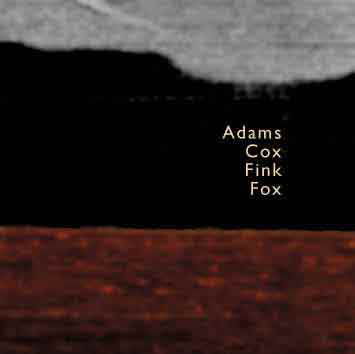
" . . . a stunning composition by Jim Fox for piano accompanied by the most subtle contributions on electric guitar and cello; a remarkable expression of subtlety and sadness." —Incursion Music Review (Canada)
"Fox's Appearance of Red has the spiritual uplift of the last movement of Crumb's Music for a Summer Evening coupled with a meditative minimalist's sensibility, a fine sense of line, and growing intimations of unease." —21st-Century Music magazine
"Electric guitar, piano, and cello create a pedal and a slow pealing figure, along with an inner timbre that grows in tension and vividness." —International Record Review
"Each of these thirteen aural environments [on Cold Blue CB0008] has its own mystery, its own Minotaur's maze to escape from, or not, as your preference may be. Strongly recommended." —Fanfare
"Fox’s Appearance of Red joins a simple, dramatic piano line with a couple of warm, floating blankets of electric guitar and cello to gorgeous effect."—Arcane Candy
Among Simple Shadows (on Dancing on Water, music of Fox, Daniel Lentz, Peter Garland, Michael Jon Fink, Rick Cox, Michael Byron, Cold Blue CB0005)
"Fox's lovely, measured, ritual soul-music finds Walker and Pezzone in consort with Smith to marvelous effect." —21st-Century Music magazine
"Expansive impressionism . . . Fox understands the empathy in Walker's playing. Fox usually works with quiet, beautifully ominous nightscapes and slow-creeping tonalities, and his Among Simple Shadows is no exception. Trumpeter Wadada Leo Smith blows a transparent, hushed last-post of a tune, which Walker shadows like the last hum resonating from the throat of a gospel bass. Bryan Pezzone's piano flaps weightlessly in the wind and casts anxious repeating clots of melody after the mingled brass and woodwind as they move through a dark-blue spectrum of emotions from quiet grief to indefinable hope." —Misfit City (UK)
". . . Jim Fox's meditation Among Simple Shadows, affirming his unique voice and compositional charm." —Incursion Music Review (Canada)
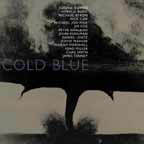
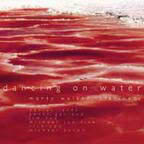
" . . . an austere, ethereal experience." — The Wire
". . . suffused with a beautiful sadness. . . . with its quietly powerful atmospheres, it compelled me to pay close attention. . . . I recommend this CD with enthusiasm." — Fanfare
". . . sounds that seem to echo across a timeless void. Imagine a view of the sky on a brilliantly clear night, from an uninhabited part of the world." —International Record Review
". . . a perfect example of music without stylistic barriers." —Deep Listenings magazine (Italy)
"Cosmological and theological questions enter the listener’s ear as if uttered by one’s lover while soundscapes build an uncertain atmosphere that wavers between cosmic void and ghostly presence. Strangely enticing . . . intimate, soft, fragmented. . . . Fox achieves an impressive balance between delicate and troubled." —All-Music Guide
"‘Hypnotic’ is a word often used as a euphemism for ‘sleep-inducing,’ but if you sleep through The Copy of the Drawing, you will miss some chillingly beautiful atmospheres. Very impressive stuff!" —ClassicalNet
"Stunning work." —Incursion Music Review (Canada)
"Most evocative and atmospheric . . . The tenor and spirit of this composition may be likened to those of Budd and perhaps Brian Eno . . . It shares with them a mysterious quality and a gentle, soothing character. The otherworldly nature of the piece is heightened by almost whispered readings by Janyce Collins . . . the work is dreamlike, seemingly without beginning or end. . . . it appears to exist outside of the realm of time." —Dean Suzuki, San Francisco Bay Guardian
"The Copy of the Drawing is a strange electronic world in which one of the elements is a reading of excerpts from strange letters written to an observatory. It’s a great atmosphere, a night music, a huge expanse of dark, empty sky. Last Things is deep and dark, moody and dreamlike, a geologically paced call-and-response between bass clarinet and pedal steel guitar, with a kind of basso profundo on the low end of the piano. As the music cycles, we are surely in a profound world. When all elements finally come together at the very end, it is an astounding musical pay-off, as dramatic as the last chords of a Beethoven symphony, but in a whole other world of understatement and subtlety." —Carl Stone
"This is music that sounds like it was made in California—not the California of celluloid freeway madness, but rather that California of cool northern beaches or the Mojave Desert as seen in the stark intimacy of Joshua Tree or even the remembered despair of the landscape around Donner Pass. This is a music of honesty, seductive and delicate yet strong and dark." — Daniel Lentz
"The words and sounds conjure up the impression of vast space, of boundless places with no beginning and no end. It is also wonderful music of the night, suffused with air, light, and darkness. It’s all more than enough to make this the disc of the year." —Blow Up magazine (Italy)
"The artist uses a wide variety of musical elements to create atmospheres full of a soft energy. The successive sonic textures take us step by step into an unexplored terrain." —Amazing Sounds
". . . slow-moving, implicatory, atmospheric and deliciously disturbing . . . Like floodwater in the night. . . . with a beautifully cool eroticism . . Fox seems to be attempting to reconcile the cosmological with the personal, as Collins' narration of astronomers' notes seem to take on revealingly intimate suggestions and to equate the paths of cosmic debris with those of people. . . . With Last Things itself, the sky is lowering. . . . Trapped between stooping sky and unquiet ground, we bear witness to a passionate, wordless pieta in which the dominant instrumental voice—Marty Walker's brilliantly torturous bass clarinet—sounds famished. . . . When Last Things fades out, we've come to terms with the fearsome displacement and anxiety in Fox's California soundscapes. To such a degree that we're likely to have failed to notice that he's finally resolved the music with a chordal and dynamic shift so subtle as to almost escape notice—like life settling itself in." —Misfit City (U.K.)
"Two strong pieces make up this CD. In 'The Copy of the Drawing,' dream-shaped, almost formless musical clouds drift about in loose structures. Sketchy skeins of electronics add much to the color. Fox repeats semi-regular electronic figures which sound like the bass end of the inside of a piano. Collins whisper-recites … You can only hear parts of the spoken texts here, excerpts of excerpts. No text is provided, which only highlights the hallucinatory character of the piece. In effect it’s here for atmosphere since you can’t pick out what’s being said most of the time. The words are then natural companions to the instrumental musical clouds. The whole thing is somewhat like David Behrman’s gentle electronic works, sounding half-composed, half-improvised, but even more formless and unanchored. It’s haunting, very beautiful and—perhaps inevitably—fugitive. [In 'Last Things,'] below are strong repetitive rumblings from the bass end of a piano. Above are mournful lines from the bass clarinet seem to come from an unknowable ceremony. Middle range: pedal steel, electronics and glass guitars (whatever they are). A very resonant result comes out of all this. It sounds like something outside our world and time. The last few minutes build to a crescendo which only underscores the lamentation nature of the piece. A solid performance, restful and edgy." —Richard Grooms, The Improvisor
"A beautiful album, even for those who know nothing of this type of music." —Musicboom (Italy)
"Last Things offers one hour of expanding sonic mist via two long electro-acoustic tracks. The Copy of the Drawing features soft, female vocals whispering tidbits of beautiful mystery while multiple layers of abstract electronic leg warmers perpetually and completely unfurl in the air and hover around your body, then turn all local matter into pure energy, and set your battered spirit gently afloat into a universe-sized vat of imaginary dark chocolate."—Arcane Candy
"Last Things is deeply alluring . . . of beauty and lonesome melancholy. It is seductive because of its highly evocative force of bringing up the star-spangled sky over the Wilson Observatory and the outer reaches of Mojave Desert with its endlessly repeated set of slightly changing vistas." —I Heard a Noise webzine (Romania)
"Both tracks exude an appealing sound world that is not only enveloping but haunting and rather eerie." —New Music Connoisseur magazine
"Both the title track and The Copy of the Drawing are quietly meditative . . . And both tracks exude an appealing sound world that is not only enveloping but haunting and rather eerie . . . eminently worthy of exploration for those keen on ambient West Coast and downtown New York idioms." —21st-Century Music magazine
"The Copy of the Drawing…Against the wash and pitch-bending by Fox, bright, tinkling synthesizer stabs reinforce the often-pensive dialogue, . . . Last Things…Marty Walker’s probing woodwind voice against a reverberating structure carries with it simultaneous characteristics of gigantic but fragile proportions. These two compositions serve as a clear reminder that ambient music is often much more compelling than audio wallpaper." —Exposé
"The copy of the drawing…. Janyce Collins whispers, as if reading love letters, confidences, giving us sweetly bewildering extracts from No One May Ever Have the Same Knowledge Again: Letters to Mt. Wilson Observatory 1915–1935, letters that combine observations, reflections, and cosmological, mystical, and symbolic meditations sent to the observatory’s astronomers by various people. The correspondents often claim to have made extraordinary discoveries, insisting that they be heard and be taken seriously, and in this way they are indeed love letters that seek to insinuate into us, to convince us, to bewitch us.... Fox dresses these fragments in his mysterious electronic music…timeless electronic poems. This music, which expands like the universe, could last for hours. Sound materials are in constant metamorphosis, expressing an indescribable odyssey, underground and mad in its interpretative delirium, piling enigma on enigma. Spiraling synthetic pads, icy percussion, metallic, distant echoes; sounds appear and disappear, suggesting another world—immemorial, unknown, fascinating, ours. Through barely audible fragments, the listener is captivated, hanging on the lips of an ethereal creature, driven as in a ritual, slowly drifting in space. ‘The mysteries of attraction, gravity is felt….’ One might say Last things…is a "cloud" composition, as if one was inside cloud formations and deformations. There the sounds are multiplied, whirled, echoed, creating a dark soundscape of random currents structured by powerful bass clarinet burts...breathing inside a secretly stormy sphere. A disk outside of time, letting itself drift...."—Inactuelles: Musiques Singulieres (France)
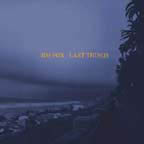
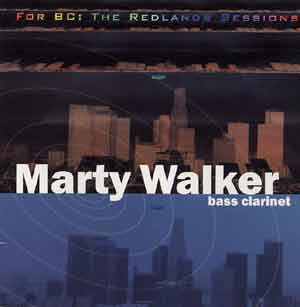
"Lyrical and sensuous." —Fanfare
"A sad and graceful piece that basks in languid and deceptive simplicity." —Josef Woodard (from the liner notes )
Between the Wheels (on New Raptorial Moon, music by Fox and others, Raptoria Caam RCD 1001)
"A kind of warm, glistening atmosphere that stirs memories of the Los Angeles night." —Alex Ross, Fanfare
Ballad of a Gunfighter (a.k.a. The Gunfighter) filmscore (Citadel STC 77119)
"I am impressed. . . . Fox creates an unmistakably Western feel without using clichés . . . To me, the primary essence of this film genre is loneliness—imagine one little man silhouetted against the burning sky and an awe-inspiring horizon. The secondary essence is nostalgia. Fox captures both of these essences in his score. His somewhat pointillistic approach is not dissimilar to that of Ennio Morricone, the master of the Western film score. . . . I was pulled in by the strong and evocative material. . . . this is fine work. I am left with the desire to repeat my acquaintance with Fox's music." —Fanfare
"In a haunting, ghostly and lyrical manner, wailed by solo violin against delicate chimes and almost human-sounding electronic vocalization . . . Most of the score has the surreal quality of a desert mirage . . . The atmosphere is almost that of a horror western . . . this is surprisingly interesting." —Film Score Monthly
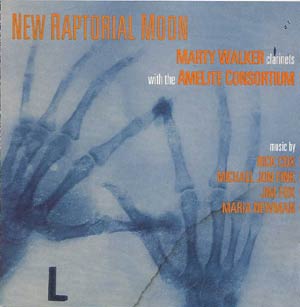
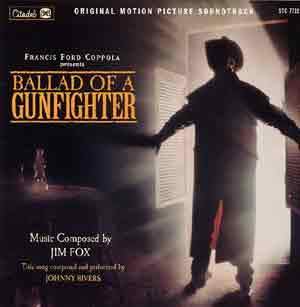
"A clarinet solo that is mournful, spare, and dramatic in its simplicity. Nuance is the name of the game." —Dean Suzuki, Option magazine
"This piece is beautiful, simple and elegantly performed. Fox's music of this period is quite unique…it's nice to have more of it recorded so excellently." —Sound Choice
"Jim Fox's effectively ethereal Solo for Single-Reed Instrument had the fewest notes on paper and one of the strongest impacts. Marty Walker played spare, finely detailed phrases on bass clarinet with elegant simplicity. . . . hypnotic . . . the work's pared-down gestures focus our listening minds on qualities other than standard virtuosity or melodic development." —Los Angeles Times
"Slow, sustained notes that could readily lend themselves to meditation as they gently faded to whispers. . .." —Ventura County Star
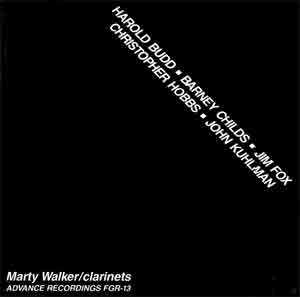
"Recognized for its clear identity as a focus for West Coast minimalism and post-minimalism. . . setting the highest standards in an area of musical endeavor where banal facility can be a danger." —The Wire
"I don't see the point in art that doesn't take any risks. Fortunately, Cold Blue does that for us, and does it all the time." —Harold Budd
"The label defines a certain ‘Southern California sound,’ uncluttered, evocative and unusual, with a wistful emotional edge." —L.A. Weekly
"A dependable source of contemporary music in the Minimalist and post-Minimalist genres. To heck with categories, though. Let’s just say that the label has the potential to be a deep well of wonder . . . Each release from Cold Blue is a letter from an alien civilization. . . . Cold Blue—how aptly named this label is!—is the soundtrack to today’s film of postmodern detachment, dread, and desire." —Fanfare
"Today's Cold Blue seems haunted by the same spirits as when it first began, compelled by the same desire to discover new musical forms, often with the most simple of gestures, but always with the most suggestive and nuanced of results." —Richard di Santo, Incursion Music Review
". . . an invaluable resource for what might be called part of the new ‘California School" . . . a label with a particular viewpoint and consummate good taste." —Joan LaBarbara
"Cold Blue offers a groove and a point of view. It's a Southern Californian meditative and hip spin on what's happening in new music." —21st Century Music magazine
"In 2000, to the astonishment and delight of those who treasured the old Cold Blue recordings, Fox decided to revive the label . . ." —New Music Box (American Music Center)
"Cold Blue discs—at least since the company's revival a couple of years ago—have tended to present music of stunning and poignant strangeness." —International Record Review
"I use the word 'gorgeous' when describing Cold Blue's recordings. And through Cold Blue I've become aware of a number of composers and their music who were not on my radar. This is definitely a CD catalog to watch." —Richard Friedman, Director of Other Minds
"Wandering trough the records released by the Venice, California-based label Cold Blue is like taking a stroll into some peaceful repository of living musical treasures. A repository that has summoned over the years some of the best representatives of the aptly named Southern California sound. . . . Listening to the music released by this South Californian label is like overhearing some joyful and delightful discussion between old friends celebrating their long-standing relationships in the realms of musical experimentation. You can feel privileged to be in their midst."—I Heard a Noise webzine (Romania)
"This is an intelligent independent label putting out well-designed and produced CDs of new music." —Rupert Loydell, Tangents (UK)
"Tailor-made to frustrate those obsessed with categories and labels . . . The label’s music is minimal without sounding rigorously systems-based; nor is its sound minimal in a way that suggests kinship with Glass and Reich beyond the inviting accessibility of their collective musics. Its uncluttered spaciousness evokes open plains and deserts, and, in spite of its name, the music eschews austerity for sensuality without lapsing into sentimentality or banality. With a lonely wistfulness at its core, its music is seductive and almost unfashionably pretty yet never cloying." —Ron Schepper, Textura and Stylus
"Among the elements commonly associated with the Cold Blue label is a propensity for inviting, even mysterious sonic beauty; an appeal to the senses that, strangely enough, seems to reach beyond sound." —Dusted webzine (2003)
"Cold Blue is a label that releases music that evokes the American west – not the smog and the stars of Los Angeles, where many of its artists are based, but the empty expanses of the deserts of southeastern California and New Mexico and of the woods of Alaska." —Dusted webzine (2004)
"Cold Blue . . . confirms itself as the star of a type of aestheticism that, at the moment, best represents that tiny piece of land enclosed by stretches of desert and rocky mountains, sweltering mesas and abandoned pueblos, insistent modernity and ancient cultures on their way to extinction. . . . Journeying along its trails is a good panacea for those who cannot go to sorcery school." —Sands-Zine (Italy)
"Cold Blue is an LA-based label, focussing on modern composition in the realms of 'West Coast minimalism' and 'post-minimalism.' Lately it has chosen the medium of CD EPs, (15 to 30 minute short duration releases), allowing the listener to concentrate on singular works w/ o the clutter. It is slowly evolving into one of the most important labels in the history of contemporary American composition." —from AB-CD catalog
"Since its relaunch slightly more than four years ago, Cold Blue Music has done sterling work in bringing to a wider public the music of a group of (mainly) Californian composers. The three latest releases, bringing the number of discs in the new Cold Blue catalogue to more than 20, are worthy contributions to a distinctive body of music—a virtual Cold Blue 'school'—forged in the wake of American musical experimentalism."—Christopher Ballantine, International Record Review
"Cold Blue Music has released a series of CD singles featuring beautifully recorded music with suitably artistic packaging. They seem to specialize in a yet-unnamed (to my knowledge) sub-genre of new music. . . . These works are designed for the discerning listener and share a common regard for well-placed sounds, yet each is distinct in its approach. . . . I recommend buying all of them, because this is definitely music worth spending time with." —Randy Raine-Reusch, MusicWorks
"From the introspection of John Luther Adams to the panache of Charlemagne Palestine—the Cold Blue Label has rarely, if ever, failed to put out music whose provocation seems the greater for its thoughtfulness."—Richard Whitehouse, Int’l Record Review
"For more than three decades, Cold Blue Music has been highlighting the work of composers working on the outer edges of contemporary music, many of whom are based on the West Coast." —Alexandra Gardner, NewMusicBox
"[T]he Californian Cold Blue label. There is nothing ‘cold’ about their music. For many years now they have been releasing some delightful minimal music which is perhaps ‘sweet’ and ‘romantic’ (both terms to be used with care)…."—Frans de Waard, Vital Weekly
"Cold Blue Music…releasing CDs by innovative minimalist and post-minimalist composers and their small ensembles since the 1980s."—Daily Planet, ABC Radio (Australia)
"The Cold Blue label has revived what the stickers describe as the CD single (although CD EP might be more accurate), which is something of a statement in the era of the download, although there's perhaps a new-old kind of logic in a physical package that contains a single composition much as a pair of covers usually contains a single book."—Roger Thomas, International Record Review
"I like Cold Blue Music a lot, and one of the things I like about it is its advocacy for the specially priced CD single. It’s nice to know that not everything needs to be stretched or padded, and that a 20-minute work can be sufficient unto itself." —Raymond Tuttle, Fanfare magazine
"Jim Fox has quietly been pressing some remarkable CDs on his Cold Blue label out of Venice, CA for a number of years now. It's a wonderful catalog of treasures." —Richard Friedman, Music from Other Minds (KALW)
"Cold Blue is a lovely label." —Kyle Gann, PostClassic
"Cold Blue is a plucky little label, under the dedicated stewardship of Jim Fox, that’s been advancing a very definite aesthetic and consistently advocating a set of composers over the years. As such it performs an important service to the cause." —Robert Carl, Fanfare